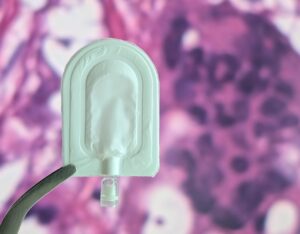March 1, 2021
A JDRF-funded clinical trial is examining whether a drug currently (ustekinumab; pronounced oos·teh·KIN·yoo·mab) used for the treatment of psoriasis (which affects the skin), Crohn’s disease (an inflammatory bowel disease), and other autoimmune conditions can also work for type 1 diabetes.
Manufactured by Janssen and sold under the name Stelara®, it is a monoclonal antibody that inhibits two molecules that regulate the immune system.
Many autoimmune diseases have disease-modifying therapies; treatments that can slow, halt, and reverse disease progression. Currently, T1D remains one of the only major autoimmune diseases that does not have a licensed disease-modifying therapy.
Clinical trial overview
The researchers are investigating if the simultaneous inhibition of two immune cell pathways—interleukin-17 and interferon-gamma, believed to drive T1D can halt the progression of, or reverse, disease in participants who have been recently diagnosed with T1D.
The hope is that if the drug can block immune cells soon after the development of diabetes, any remaining insulin-producing cells may be protected and regenerate. This would ideally lead to the remaining beta cells producing enough insulin that people with T1D require less external insulin for a longer period of time, or at all.
As the drug is already approved for use in Canada, if the trial results are positive, moving forward to clinical use would not only be feasible, but rapid.
The phase II/III trial is taking place at BCDiabetes in Vancouver, under the leadership of Tom Elliott, MBBS, and the University of Toronto, under Bruce Perkins, M.D., MPH, both in Canada. There will be a total of 60 participants enrolled between the ages of 18-25 years old.
There is also a trial testing ustekinumab in teens aged 12-18, and within 100 days of diagnosis in various locations of the United Kingdom.
A JDRF grant to Megan Levings, Ph.D., at the BC Children’s Hospital Research Institute, will harmonize the biomarkers of response in both the Canadian and UK clinical trials, increasing the sample size and more rapidly identifying whether this is an effective therapy for T1D.
A pilot study by Jan Dutz, M.D.—who is also the lead on the phase II/III study—demonstrated that ustekinumab is safe in the treatment of participants with recent-onset T1D.
You can contact Marla Inducil, B.Sc. Pharm, M.D., CCRP, at 604-628-7253 ext. 7011 or minducil@bcdiabetes.ca. She is responsible for managing and executing all clinical trials at BCDiabetes located in Vancouver.



